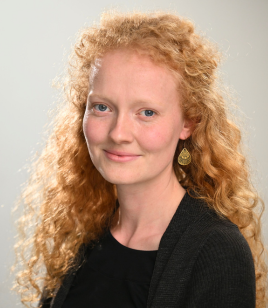Stipendiat:innen /
Porträts
Paula Engelke (English version)

Topic of doctoral thesis: "Generalization of fear extinction learning"
University of WürzburgFor Paula Engelke, the combination of a doctoral scholarship and a position as part of the Marianne-Plehn-Program (MPP) was a complete success. As a young mother of three children, however, reconciling her academic work with caring for her children was a particular challenge.
How can fear actually be 'unlearned'? Paula Engelke has explored this question since she began her doctorate at the Chair of Clinical Psychology and Psychotherapy at the University of Würzburg. The Studienstiftung has supported her with a doctoral scholarship since 2019. "Anxiety disorders can lead to severe restrictions in everyday life. In so-called exposure-based methods, patients are repeatedly confronted with a fear-inducing stimulus without the actual feared event occurring," explains the scholarship holder. " However, even after the therapy has been successfully completed, the fear returns again and again." Paula Engelke would like to understand the underlying mechanisms of this process in greater detail with her laboratory-experimental research and thus contribute to an improved treatment of anxiety disorders.
Additional experience through her work in the research project
Towards the end of 2020, Paula Engelke applied for the MPP and started her new position in a research project at her chair in March 2021. "This also allowed me to gain further experience in supervising students. I was also able to gain many practical impressions of everyday therapeutic practice by attending case discussions," says the 30-year-old, looking back on her work until the beginning of 2024.
It was also the stronger integration into an academic environment that helped Paula Engelke with her doctorate: "Academic work is rarely straightforward and a good network is worth gold, especially when it comes to discussing your own progress and failures."
Doing a PhD with children
Paula Engelke is not just professionally based in Würzburg, where she completed her Bachelor's and Master's degrees. It is also the home of her family of five. Although she had already experienced the compatibility of academic work and care work during her studies, she found doing a doctorate with children challenging: "The possibility of being able to work at any time occasionally made me feel guilty when I wanted to spend time with my children or was responsible for care work."
However, the individual structure of the doctoral scholarship helped her to organise her everyday family life, which changed again with the birth of her third child in the second year of her doctorate and the lack of external childcare due to the pandemic. "My position as an employee with social security coverage gave me more leeway in planning my parental leave," says Paula Engelke. Networking with other parents working on their doctorates was also helpful for the young psychologist, as similar challenges and questions often arose despite different disciplines. "Even though my experiences with the scholarship and at my university have been predominantly positive, many structures in the academic world have only just started to systematically factor in care responsibilities."
The scholarship holder was therefore particularly pleased that it was possible for children and caregivers to participate in the various events of the program without any problems. "The MPP is a great addition to the doctoral scholarship, especially because of the great flexibility with regard to the location and design of the position, and it was easy for me to combine my doctorate with raising my children."
More information
Last updated: July 2024

